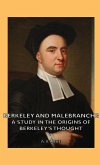- Gebundenes Buch
- Merkliste
- Auf die Merkliste
- Bewerten Bewerten
- Teilen
- Produkt teilen
- Produkterinnerung
- Produkterinnerung
This volume sets Berkeley's philosophy in its historical context by providing selections from influential and contemporary works.
Andere Kunden interessierten sich auch für
![Berkeley and Malebranche - A Study in the Origins of Berkeley's Thought Berkeley and Malebranche - A Study in the Origins of Berkeley's Thought]() A. A. LuceBerkeley and Malebranche - A Study in the Origins of Berkeley's Thought41,99 €
A. A. LuceBerkeley and Malebranche - A Study in the Origins of Berkeley's Thought41,99 €![Berkeley & Malebranche - A Study in the Origins of Berkeley's Thought Berkeley & Malebranche - A Study in the Origins of Berkeley's Thought]() A a LuceBerkeley & Malebranche - A Study in the Origins of Berkeley's Thought132,99 €
A a LuceBerkeley & Malebranche - A Study in the Origins of Berkeley's Thought132,99 €![Berkeley's Argument for Idealism Berkeley's Argument for Idealism]() Samuel C RicklessBerkeley's Argument for Idealism126,99 €
Samuel C RicklessBerkeley's Argument for Idealism126,99 €![Naturalising Berkeley's Unperceived Perceivable Naturalising Berkeley's Unperceived Perceivable]() Georgiou SantosNaturalising Berkeley's Unperceived Perceivable11,99 €
Georgiou SantosNaturalising Berkeley's Unperceived Perceivable11,99 €![Three Dialogues Between Hylas and Philonous Three Dialogues Between Hylas and Philonous]() George BerkeleyThree Dialogues Between Hylas and Philonous16,99 €
George BerkeleyThree Dialogues Between Hylas and Philonous16,99 €![Responsibility and Control Responsibility and Control]() John Martin FischerResponsibility and Control60,99 €
John Martin FischerResponsibility and Control60,99 €![A Treatise Concerning the Principles of Human Knowledge A Treatise Concerning the Principles of Human Knowledge]() George BerkeleyA Treatise Concerning the Principles of Human Knowledge18,99 €
George BerkeleyA Treatise Concerning the Principles of Human Knowledge18,99 €-
-
-
This volume sets Berkeley's philosophy in its historical context by providing selections from influential and contemporary works.
Hinweis: Dieser Artikel kann nur an eine deutsche Lieferadresse ausgeliefert werden.
Hinweis: Dieser Artikel kann nur an eine deutsche Lieferadresse ausgeliefert werden.
Produktdetails
- Produktdetails
- Verlag: Cambridge University Press
- Seitenzahl: 312
- Erscheinungstermin: 22. Januar 2016
- Englisch
- Abmessung: 235mm x 157mm x 23mm
- Gewicht: 659g
- ISBN-13: 9780521496810
- ISBN-10: 0521496810
- Artikelnr.: 25319769
- Herstellerkennzeichnung
- Libri GmbH
- Europaallee 1
- 36244 Bad Hersfeld
- gpsr@libri.de
- Verlag: Cambridge University Press
- Seitenzahl: 312
- Erscheinungstermin: 22. Januar 2016
- Englisch
- Abmessung: 235mm x 157mm x 23mm
- Gewicht: 659g
- ISBN-13: 9780521496810
- ISBN-10: 0521496810
- Artikelnr.: 25319769
- Herstellerkennzeichnung
- Libri GmbH
- Europaallee 1
- 36244 Bad Hersfeld
- gpsr@libri.de
George Berkeley (/'b¿¿rkli/;[4][5] 12 March 1685 - 14 January 1753) - known as Bishop Berkeley (Bishop of Cloyne) - was an Irish philosopher whose primary achievement was the advancement of a theory he called "immaterialism" (later referred to as "subjective idealism" by others). This theory denies the existence of material substance and instead contends that familiar objects like tables and chairs are only ideas in the minds of perceivers and, as a result, cannot exist without being perceived. Berkeley is also known for his critique of abstraction, an important premise in his argument for immaterialism. In 1709, Berkeley published his first major work, An Essay Towards a New Theory of Vision, in which he discussed the limitations of human vision and advanced the theory that the proper objects of sight are not material objects, but light and colour.[6] This foreshadowed his chief philosophical work, A Treatise Concerning the Principles of Human Knowledge, in 1710, which, after its poor reception, he rewrote in dialogue form and published under the title Three Dialogues between Hylas and Philonous in 1713.[7] In this book, Berkeley's views were represented by Philonous (Greek: "lover of mind"), while Hylas (Greek: "matter") embodies the Irish thinker's opponents, in particular John Locke. Berkeley argued against Isaac Newton's doctrine of absolute space, time and motion in De Motu[8] (On Motion), published 1721. His arguments were a precursor to the views of Mach and Einstein.[9][10] In 1732, he published Alciphron, a Christian apologetic against the free-thinkers, and in 1734, he published The Analyst, a critique of the foundations of calculus, which was influential in the development of mathematics.[11] Interest in Berkeley's work increased after World War II because he tackled many of the issues of paramount interest to philosophy in the 20th century, such as the problems of perception, the difference between primary and secondary qualities, and the importance of language
Introduction
Part I. The Background to Berkeley's Philosophy: 1. René Descartes
2. Henricus Regius
3. Nicolas Malebranche
4. Antoine Arnauld
5. Jean Brunet
6. Pierre Bayle
7. John Locke
8. Henry Lee
9. John Norris
10. Arthur Collier
Part II. Reactions to Berkeley's Philosophy: 11. First reactions
12. Early reviews
13. G. W. Leibniz
14. Andrew Baxter
15. David Hume
16. Samuel Johnson
17. French reactions
18. German reactions
19. Thomas Reid
20. John Stuart Mill.
Part I. The Background to Berkeley's Philosophy: 1. René Descartes
2. Henricus Regius
3. Nicolas Malebranche
4. Antoine Arnauld
5. Jean Brunet
6. Pierre Bayle
7. John Locke
8. Henry Lee
9. John Norris
10. Arthur Collier
Part II. Reactions to Berkeley's Philosophy: 11. First reactions
12. Early reviews
13. G. W. Leibniz
14. Andrew Baxter
15. David Hume
16. Samuel Johnson
17. French reactions
18. German reactions
19. Thomas Reid
20. John Stuart Mill.
Introduction
Part I. The Background to Berkeley's Philosophy: 1. René Descartes
2. Henricus Regius
3. Nicolas Malebranche
4. Antoine Arnauld
5. Jean Brunet
6. Pierre Bayle
7. John Locke
8. Henry Lee
9. John Norris
10. Arthur Collier
Part II. Reactions to Berkeley's Philosophy: 11. First reactions
12. Early reviews
13. G. W. Leibniz
14. Andrew Baxter
15. David Hume
16. Samuel Johnson
17. French reactions
18. German reactions
19. Thomas Reid
20. John Stuart Mill.
Part I. The Background to Berkeley's Philosophy: 1. René Descartes
2. Henricus Regius
3. Nicolas Malebranche
4. Antoine Arnauld
5. Jean Brunet
6. Pierre Bayle
7. John Locke
8. Henry Lee
9. John Norris
10. Arthur Collier
Part II. Reactions to Berkeley's Philosophy: 11. First reactions
12. Early reviews
13. G. W. Leibniz
14. Andrew Baxter
15. David Hume
16. Samuel Johnson
17. French reactions
18. German reactions
19. Thomas Reid
20. John Stuart Mill.








